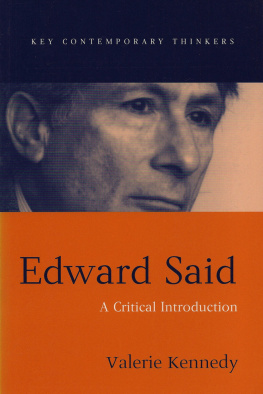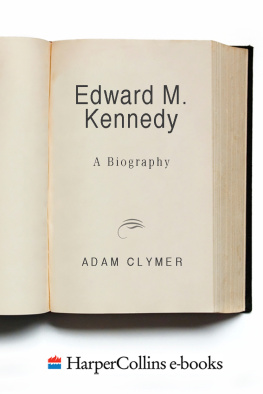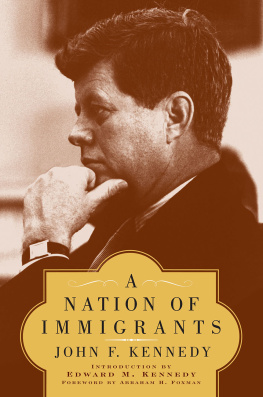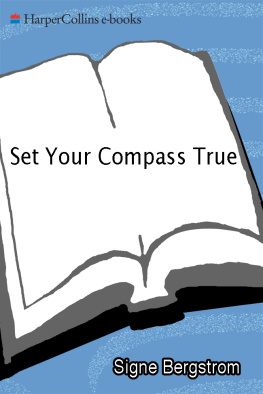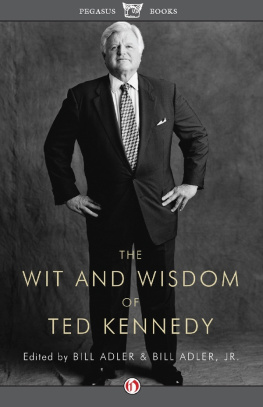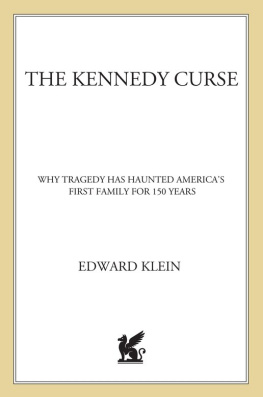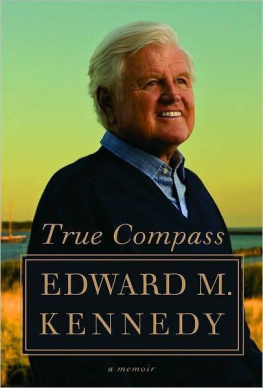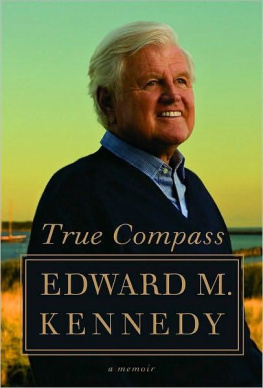Kennedy Valerie - Edward Said: a critical introduction
Here you can read online Kennedy Valerie - Edward Said: a critical introduction full text of the book (entire story) in english for free. Download pdf and epub, get meaning, cover and reviews about this ebook. City: Bližnji vzhod;Cambridge;Middle East, year: 2001;2013, publisher: Wiley;Polity, genre: Politics. Description of the work, (preface) as well as reviews are available. Best literature library LitArk.com created for fans of good reading and offers a wide selection of genres:
Romance novel
Science fiction
Adventure
Detective
Science
History
Home and family
Prose
Art
Politics
Computer
Non-fiction
Religion
Business
Children
Humor
Choose a favorite category and find really read worthwhile books. Enjoy immersion in the world of imagination, feel the emotions of the characters or learn something new for yourself, make an fascinating discovery.
- Book:Edward Said: a critical introduction
- Author:
- Publisher:Wiley;Polity
- Genre:
- Year:2001;2013
- City:Bližnji vzhod;Cambridge;Middle East
- Rating:3 / 5
- Favourites:Add to favourites
- Your mark:
- 60
- 1
- 2
- 3
- 4
- 5
Edward Said: a critical introduction: summary, description and annotation
We offer to read an annotation, description, summary or preface (depends on what the author of the book "Edward Said: a critical introduction" wrote himself). If you haven't found the necessary information about the book — write in the comments, we will try to find it.
Edward Said: a critical introduction — read online for free the complete book (whole text) full work
Below is the text of the book, divided by pages. System saving the place of the last page read, allows you to conveniently read the book "Edward Said: a critical introduction" online for free, without having to search again every time where you left off. Put a bookmark, and you can go to the page where you finished reading at any time.
Font size:
Interval:
Bookmark:

Copyright Valerie Kennedy 2000
The right of Valerie Kennedy to be identified as author of this work has been asserted in accordance with the Copyright, Designs and Patents Act 1988.
First published in 2000 by Polity Press in association with Blackwell Publishers Ltd
Editorial office:
Polity Press
65 Bridge Street
Cambridge CB2 1UR, UK
Marketing and production:
Blackwell Publishers Ltd
108 Cowley Road
Oxford OX4 1JF, UK
Published in the USA by
Blackwell Publishers Inc.
Commerce Place
350 Main Street
Malden, MA 02148, USA
All rights reserved. Except for the quotation of short passages for the purposes of criticism and review, no part of this publication may be reproduced, stored in a retrieval system, or transmitted, in any form or by any means, electronic, mechanical, photocopying, recording or otherwise, without the prior permission of the publisher.
Except in the United States of America, this book is sold subject to the condition that it shall not, by way of trade or otherwise, be lent, re-sold, hired out, or otherwise circulated without the publishers prior consent in any form of binding or cover other than that in which it is published and without a similar condition including this condition being imposed on the subsequent purchaser.
ISBN 0-7456-2018-3
ISBN 0-7456-2019-1 (pbk)
ISBN 9780-7456-6745-4 (epub)
ISBN 9780-7456-6744-7 (mobi)
ISBN 9780-7456-7759-0 (epdf)
A catalogue record for this book is available from the British Library and has been applied for from the Library of Congress.
Key Contemporary Thinkers
Published
Jeremy Ahearne, Michel de Certeau: Interpretation and its Other
Peter Burke, The French Historical Revolution: The Annales School 19291989
Michael Caesar, Umberto Eco: Philosophy, Semiotics and the Work of Fiction
Colin Davis, Levinas: An Introduction
Simon Evnine, Donald Davidson
Edward Fullbrook and Kate Fullbrook, Simone de Beauvoir: A Critical Introduction
Andrew Gamble, Hayek: The Iron Cage of Liberty
Philip Hansen, Hannah Arendt: Politics, History and Citizenship
Sean Homer, Fredric Jameson: Marxism, Hermeneutics, Postmodernism
Christopher Hookway, Quine: Language, Experience and Reality
Christina Howells, Derrida: Deconstruction from Phenomenology to Ethics
Simon Jarvis, Adorno: A Critical Introduction
Douglas Kellner, Jean Baudrillard: From Marxism to Post-Modernism and Beyond
Valerie Kennedy, Edward Said
Chandran Kukathas and Philip Pettit, Rawls: A Theory of Justice and its Critics
James McGilvray, Chomsky: Language, Mind, and Politics
Lois McNay, Foucault: A Critical Introduction
Philip Manning, Erving Goffman and Modern Sociology
Michael Moriarty, Roland Barthes
William Outhwaite, Habermas: A Critical Introduction
John Preston, Feyerabend: Philosophy, Science and Society
Susan Sellers, Hlne Cixous: Authorship, Autobiography and Love
David Silverman, Harvey Sacks: Social Science and Conversation Analysis
Dennis Smith, Zygmunt Bauman: Prophet of Postmodernity
Geoffrey Stokes, Popper: Philosophy, Politics and Scientific Method
Georgia Warnke, Gadamer: Hermeneutics, Tradition and Reason
James Williams, Lyotard: Towards a Postmodern Philosophy
Jonathan Wolff, Robert Nozick: Property, Justice and the Minimal State
Forthcoming
Maria Baghramian, Hilary Putnam
Sara Beardsworth, Kristeva
Mark Cain, Fodor: Language, Mind and Philosophy
James Carey, Innis and McLuhan
Rosemary Cowan, Cornell West: The Politics of Redemption
George Crowder, Isaiah Berlin: Liberty, Pluralism and Liberalism
Thomas DAndrea, Alasdair MacIntyre
Eric Dunning, Norbert Elias
Jocelyn Dunphy, Paul Ricoeur
Matthew Elton, Daniel Dennett
Nigel Gibson, Frantz Fanon
Graeme Gilloch, Walter Benjamin
Karen Green, Dummett: Philosophy of Language
Espen Hammer, Stanley Cavell
Keith Hart, C.L.R. James
Fred Inglis, Clifford Geertz: Culture, Custom and Ethics
Sarah Kay, izek: A Critical Introduction
Paul Kelly, Ronald Dworkin
Carl Levy, Antonio Gramsci
Moya Lloyd, Judith Butler
Dermot Moran, Edmund Husserl
Harold Noonan, Frege
Steve Redhead, Paul Virilio: Theorist for an Accelerated Culture
Chris Rojek, Stuart Hall and Cultural Studies
Wes Sharrock and Rupert Read, Kuhn
Nick Smith, Charles Taylor
Nicholas Walker, Heidegger
Acknowledgements
Many thanks to Susanne Kappeler for initiating this project. I would also like to thank Lester Barber, Stephen Buick, Thomas F. Daughton, Jamil Khadir, Anthony Lake, Hasna Lebbady and Sita Schutt for reading and discussing part or all of various versions of this text, and for their support and encouragement. Thanks to Mohammed Dahbi and Michael Toler for copies of articles and to Francesca Cauchi for reading the proofs and help with the index. I would also like to thank Bilkent University, Ankara, Turkey, for some financial support for this project.
I would like to express my most grateful thanks to Edward W. Said for his gracious permission to reproduce material from the following works:
Culture and Imperialism (World English language rights, excluding the USA).
Opponents, audiences, constituencies, and community; Interview, in Diacritics , 1976; Shattered myths, From silence to sound and back again, Figures, configurations, transfigurations; Interview in boundary 2 , 1993; Homage to a belly-dancer; Interview in Edward Said: A Critical Reader , ed. Michael Sprinker; Interview in A Critical Sense , ed. Peter Osborne; The Arab Right Wing; The Arab-American war, Identity, negation, and violence; The Other Arab Muslims; Orientalism reconsidered; The politics of knowledge.
I would also like to thank the following for their kind permission to reproduce material from the following works:
Random House UK and Chatto and Windus for Culture and Imperialism by Edward Said; Faber and Faber Ltd. for Tradition and the individual talent, in The Sacred Wood (new edition, 1997) by T. S. Eliot; Harcourt Inc. for Tradition and the individual talent in Selected Essays by T. S. Eliot.
I would also like to thank Random House USA for permission to reproduce material as follows:
From Orientalism by Edward W. Said. Copyright 1978 by Edward W. Said. Reprinted by permission of Pantheon Books, a Division of Random House Inc.; From Culture and Imperialism by Edward W. Said. Copyright 1993 by Edward W. Said. Reprinted by permission of Alfred A. Knopf Inc.
Abbreviations
Works by Said
Books
ALS After the Last Sky (1986)
B Beginnings (1975)
BV Blaming the Victims (1988)
CI Culture and Imperialism (1993)
CIs Covering Islam (1981)
JC Joseph Conrad and the Fiction of Autobiography (1966)
ME Musical Elaborations (1991)
O Orientalism (1978)
PandS The Pen and the Sword (1994)
PD Peace and Its Discontents (1995)
PolD The Politics of Dispossession (1995)
QP The Question of Palestine (1979)
RI Representations of the Intellectual (1994)
WTC The World, the Text, and the Critic (1983)
Interviews
D Diacritics interview (1976)
I Interview with Jennifer Wicke and Michael Sprinker (1992)
Articles
F Figures, configurations, transfigurations (1990)
FW Foreword to Little Mountain by Elias Khoury (1989)
Int Introduction to Days of Dust by Halim Barakat (1983)
OR Orientalism reconsidered (1985)
Font size:
Interval:
Bookmark:
Similar books «Edward Said: a critical introduction»
Look at similar books to Edward Said: a critical introduction. We have selected literature similar in name and meaning in the hope of providing readers with more options to find new, interesting, not yet read works.
Discussion, reviews of the book Edward Said: a critical introduction and just readers' own opinions. Leave your comments, write what you think about the work, its meaning or the main characters. Specify what exactly you liked and what you didn't like, and why you think so.

